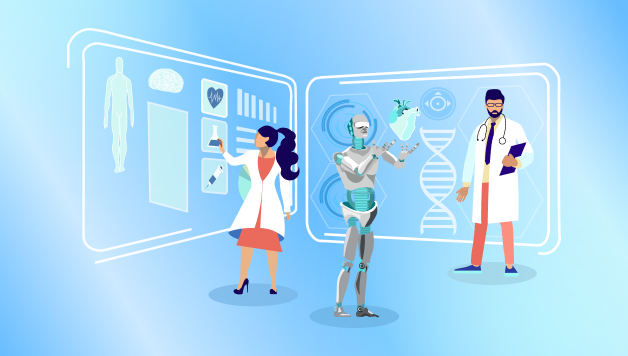How AI is Revolutionizing Pharmacy Operations for a Smarter Future
Introduction
Pharmacies are no longer just places where prescriptions are filled. In today’s digital era, they are becoming data-driven hubs powered by the transformative force of Artificial Intelligence (AI). With rising patient expectations, complex drug interactions, and mounting administrative tasks, the need for streamlined, efficient, and accurate operations has never been greater. Enter AI in Pharmacy Operations—a game-changer that’s redefining how pharmacies function, interact with patients, and deliver better health outcomes.
AI is not simply a futuristic concept; it’s already here, driving real-world improvements in the pharmaceutical sector. From inventory management and personalized medication reminders to robotic dispensing and predictive analytics, Automation in the pharmacy is helping reduce human error, improve efficiency, and create a more intelligent pharmacy workflow.
The Rise of Automation in the Pharmacy
The surge of Automation in Pharmacy is no accident. With thousands of prescriptions being processed daily, pharmacists face growing pressure to ensure accuracy, compliance, and speed—all while providing personalized care. By integrating Artificial Intelligence in Pharmacy Workflow, routine tasks such as prescription verification, medication labeling, and drug interaction checks can now be handled with unprecedented precision.
AI-powered systems are also being used to forecast demand for certain medications based on past purchase patterns and seasonal trends. This not only reduces waste but ensures essential drugs are always in stock, which is crucial for both profitability and patient satisfaction. Such predictive models are proving to be vital in crises, like pandemics, where demand can shift suddenly.
How AI in Pharmacy Operations Is Driving Efficiency
The implementation of AI in Pharmacy Operations is allowing pharmacies to transform their internal workflows. For instance, intelligent software can now scan electronic prescriptions for potential issues, such as dosage errors or allergic reactions, and alert the pharmacist before the medication is dispensed. This kind of real-time monitoring significantly enhances patient safety.
Moreover, chatbots and virtual assistants are being used in customer-facing roles, answering common queries, helping schedule refills, and even sending reminders to patients. This reduces the burden on pharmacists and allows them to focus more on patient consultations and clinical decisions.
From the backend to the front desk, AI in Pharmacy Operations is optimizing every stage of the pharmaceutical process, allowing for smarter, more scalable services.
Enhancing Inventory and Supply Chain Management
Inventory management is one of the most time-consuming tasks in any pharmacy. AI helps automate stock tracking, expiry date monitoring, and reordering of supplies. Through Artificial Intelligence in Pharmacy Workflow, pharmacies can now predict stock shortages and adjust supply chains dynamically based on real-time data.
AI algorithms analyze historical sales data, supplier lead times, and local market trends to suggest the best times and quantities for reordering. This reduces manual oversight, minimizes overstocking or stockouts, and leads to better financial and operational control.
In multi-location pharmacy chains, AI also enables centralized visibility into inventory levels, allowing for more efficient distribution of stock among branches.
Supporting Pharmacist Decision-Making
Far from replacing human pharmacists, AI acts as a powerful assistant. Clinical decision support systems powered by AI provide real-time, evidence-based insights. These systems can cross-reference patient medical histories with current prescriptions to identify adverse interactions or contraindications.
Such tools are especially useful when pharmacists are under time pressure or when dealing with complex cases. By leveraging Artificial Intelligence in Pharmacy Workflow, pharmacists can make more informed decisions faster, enhancing both accuracy and care quality.
AI also plays a pivotal role in pharmaceutical research and development. It can analyze vast amounts of data from clinical trials and real-world usage to suggest improvements in drug formulations or discover new therapeutic applications.
Personalizing the Patient Experience
Today’s healthcare consumers expect personalized services—and pharmacies are no exception. AI helps tailor medication regimens, dosage schedules, and even communication preferences to individual needs.
For example, mobile apps integrated with pharmacy databases can notify patients when it’s time to take their medication or schedule a refill. These systems can also learn from patient behavior to improve adherence over time.
By using AI in Pharmacy Operations, pharmacies can create personalized wellness plans that go beyond prescription management, offering lifestyle advice, nutritional guidance, and preventive care tips—all tailored to the patient’s history and goals.
AI-Powered Fraud Detection and Compliance
Fraud and non-compliance are significant challenges in the pharmaceutical industry. AI can help detect anomalies in billing, prescription patterns, and insurance claims. These smart systems flag suspicious activities for further investigation, helping prevent revenue loss and legal liabilities.
AI also assists in maintaining regulatory compliance. By automatically updating drug information, labeling guidelines, and safety alerts, pharmacies can ensure they’re always operating within current laws and standards.
Challenges and the Road Ahead
Despite its many benefits, implementing AI in pharmacy settings isn’t without challenges. Data privacy, high implementation costs, and the need for staff training are all valid concerns. However, these barriers are being gradually overcome through better regulations, cloud-based solutions, and specialized partners.
Working with an experienced AI Automation Agency can simplify the integration process. These agencies provide tailored solutions that align with a pharmacy’s specific needs, ensuring both scalability and compliance from day one.
Looking ahead, the integration of AI with other emerging technologies like IoT (Internet of Things) and blockchain could lead to even more groundbreaking innovations. Imagine smart pill bottles that communicate with a pharmacy in real time or a decentralized medication verification system powered by blockchain.
Conclusion: A Smarter Future Starts Now
The digital transformation of pharmacy operations is no longer a question of “if” but “how fast.” As AI continues to evolve, it’s clear that its role in pharmacies will only expand. With enhanced efficiency, safety, and personalization, AI in Pharmacy Operations is shaping a smarter, patient-first future.
By embracing Artificial Intelligence in Pharmacy Workflow, pharmacies can go beyond simply dispensing medication—they can become proactive healthcare partners. Whether it’s improving internal processes, supporting clinical decisions, or enhancing patient engagement, the future of pharmacy is intelligent, data-driven, and ready for the next leap forward.




Leave a Reply
Want to join the discussion?Feel free to contribute!